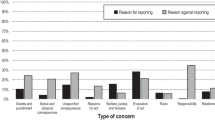Abstract
In this study, 40.3% of faculty members admitted to ignoring student cheating on one or more occasions. The quality of past experience in dealing with academic integrity violations was examined. Faculty members with previous bad experiences were more likely to prefer dealing with cheating by ignoring it. The data were further analysed to determine beliefs and attitudes that distinguish between faculty who have never ignored an instance of cheating and those who indicated that they have ignored one or more instances in the past. The stated reasons for ignoring cheating included insufficient evidence, triviality of the offense, and insufficient time; however, it was demonstrated that faculty who ignored academic integrity violations felt more stressed when speaking to students about cheating, preferred to avoid emotionally charged situations, and indicated that if a student were likely to become emotional, they were less likely to speak to him or her.
Similar content being viewed by others
References
Ajzen, I. (1988). Attitudes, personality, and behavior. Chicago: Dorsey.
Ajzen, I. (1991). The theory of planned behavior. Organizational Behavior and Human Decision Processes, 50(2), 179–211.
Aldridge, A., & Levine, K. (2001). Surveying the social world: Principles and practice in survey research. Philadelphia: Open University Press.
Anderson, C. J. (2003). The psychology of doing nothing: forms of decision avoidance result from reason and emotion. Psychological Bulletin, 129(1), 139.
Barrett, R., & Cox, A. L. (2005). At least they’re learning something: the hazy line between collaboration and collusion. Assessment and Evaluation in Higher Education, 30(2), 107–122.
Borg, E. (2002, July). Northumbria University lecturers’ experiences of plagiarism and collusion. Paper presented at the First Northumbria Conference—Educating for the Future, Newcastle on Tyne, UK.
Bowers, W. J. (1964). Student dishonesty and its control in college. New York: Bureau of Applied Social Research, Columbia University.
Dordoy, A. (2002, July). Cheating and plagiarism: Student and staff perceptions at Northumbria. Paper presented at the First Northumbria Conference—Educating for the Future, Newcastle on Tyne, UK.
Greene, A. S., & Saxe, L. (1992). Everyone (else) does it: Academic cheating. Paper presented at the meeting of the Eastern Psychological Association Convention, Boston, MA. Retrieved from ERIC database. (ERIC Document Reproduction Service No. ED347931)
Hibbert, C. (1998). Nelson: A personal history. Toronto: HarperCollins Canada.
Keith-Spiegel, P., Tabachnick, B. G., Whitley, B. E., Jr., & Washburn, J. (1998). Why professors ignore cheating: opinions of a national sample of psychology instructors. Ethics and Behavior, 8(3), 215–227.
Mainka, C., & Raeburn, S. (2006). Investigating staff perceptions of academic misconduct: First results in one school. Paper presented at the Second International Plagiarism Conference, The Sage Gateshead, UK.
Mangione, T. W. (1995). Mail surveys: Improving the quality. Thousand Oaks: Sage.
McCabe, D. L. (2004a). Academic integrity: Rutgers University faculty survey. Retrieved from http://integrity.rutgersedu/rutgersfac.asp
McCabe, D. L. (2004b, October 9–11) Student cheating: Crisis or opportunity? Paper presented at the Center for Academic Integrity Conference, Kansas State University, Manhattan, KS.
Meyer, G. D., & Bloemer, H. (2006). Plagiarism in the department of mechanical engineering in the Russ College of Engineering at Ohio University. Retrieved from http://www.ohio.edu/outlook/media/BMIR.cfm
Rettinger, D. A., Jordan, A. E., & Peschiera, F. (2004). Evaluating the motivation of other students to cheat: a vignette experiment. Research in Higher Education, 45(8), 873–890.
Sherman, A. J. (2005). Schools for scandal. New England Review, 26(3), 82–91.
Southey, R. (1908). The life of Horatio Lord Nelson. Retrieved from http://www.gutenberg.org/ebooks/947.
Stern, E. B., & Havlicek, L. (1986). Academic misconduct: results of faculty and undergraduate student surveys. Journal of Allied Health, 5(2), 129–142.
Tabachnick, B. G., Keith-Spiegel, P., & Pope, K. S. (1991). Ethics of teaching: beliefs and behaviours of psychologists as educators. American Psychologist, 46(5), 506–515.
Volpe, R., Davidson, L., & Bell, M. C. (2008). Faculty attitudes and behaviors concerning student cheating. College Student Journal, 42(1), 164–175.
Wasley, P. (2006, August 11). The plagiarism hunter. Chronicle of Higher Education, p. A8.
Author information
Authors and Affiliations
Corresponding author
Rights and permissions
About this article
Cite this article
Coren, A. Turning a Blind Eye: Faculty Who Ignore Student Cheating. J Acad Ethics 9, 291–305 (2011). https://doi.org/10.1007/s10805-011-9147-y
Published:
Issue Date:
DOI: https://doi.org/10.1007/s10805-011-9147-y




